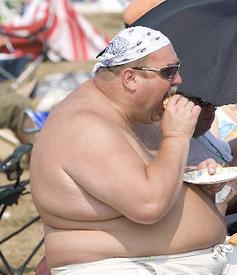I think we are meant to be fat...

Kotuliak
Posts: 259 Member
Just came across this:
Source: http://www.ncbi.nlm.nih.gov/pubmed/20935667
The increasing prevalence of obesity and its comorbidities reflects the interaction of genes that favor the storage of excess energy as fat with an environment that provides ad libitum availability of energy-dense foods and encourages an increasingly sedentary lifestyle. Although weight reduction is difficult in and of itself, anyone who has ever lost weight will confirm that it is much harder to keep the weight off once it has been lost. The over 80% recidivism rate to preweight loss levels of body fatness after otherwise successful weight loss is due to the coordinate actions of metabolic, behavioral, neuroendocrine and autonomic responses designed to maintain body energy stores (fat) at a central nervous system-defined 'ideal'. This 'adaptive thermogenesis' creates the ideal situation for weight regain and is operant in both lean and obese individuals attempting to sustain reduced body weights. Much of this opposition to sustained weight loss is mediated by the adipocyte-derived hormone 'leptin'. The multiple systems regulating energy stores and opposing the maintenance of a reduced body weight illustrate that body energy stores in general and obesity in particular are actively 'defended' by interlocking bioenergetic and neurobiological physiologies. Important inferences can be drawn for therapeutic strategies by recognizing obesity as a disease in which the human body actively opposes the 'cure' over long periods of time beyond the initial resolution of symptomatology.
Source: http://www.ncbi.nlm.nih.gov/pubmed/20935667
0
Replies
-
Can you please explain what you mean by your title and your large quoted text?0
-
Wrong. They're using homeostasis as an argument for people being fat.0
-
Should....should I quit trying and working so hard on myself?
Should they put MFP down?
What does it mean?
*rolls back and forth in a fetal position*
*sucks her thumb*0 -
If obesity is a disease, then we obviously are not meant to be fat. While storing some fat is good-- in case one experiences nutrient deprivation-- storing an excess of fat is not beneficial. At all.0
-
Has no one seen WALL-E?! We are not meant to be fat nor should we be drinking 32oz Buy &Large shakes for sustenance or riding around in hover crafts because we're so fat :noway:0
-
^ Wow. Just... wow.Can you please explain what you mean by your title and your large quoted text?
This reply is clearly a scathing indictment of the education system in this country, and its lack of focus on physical health and well being. I thought the articule was clear and concise. It was an interesting read. And it would make a great excuse for why I managed to put back on 10lbs.
But I know that in truth, these reasons are secondary to the primary distal cause: I just let myself get lazy.0 -
Can you please explain what you mean by your title and your large quoted text?
Sorry.
The title is meant as a joke. Sarcasm, to be precise.
The large quoted text speaks for itself, though I agree that your comprehension may vary. As with most articles, it is an opinion, and I only posted it as an item of general interest for those who might find it interesting.
I certainly did not mean to offend anyone's sensibilities or worldview.0 -
Well, there is still a point to where being more than a little overweight, even being obese, can increase your chances of getting things like diabetes or other health problems, and if you don't lose even a little bit of weight you may not even have self esteem, because it's just pure crap. There is no such thing as meant to be fat, in my opinion.0
-
0
-
Yep, the body is pretty much designed to eat food when it is available and store the extra energy against later periods of food shortage. It's a pretty neat trick and doubtless got us this far as a species. Now we are too successful in accessing food (at least in some parts of the world).
It also makes sense that the body wants to establish homeostasis and will use an accustomed weight as a "set point" for what is "normal". If it was easy to override this, no one would be overweight!0 -
Sorry, scathing wtf? I understood the text. I wanted the OP to contextualize his TITLE. Is he being facetious? Is he serious? What is HE suggesting.
^ Wow. Just... wow.Can you please explain what you mean by your title and your large quoted text?
This reply is clearly a scathing indictment of the education system in this country, and its lack of focus on physical health and well being. I thought the articule was clear and concise. It was an interesting read. And it would make a great excuse for why I managed to put back on 10lbs.
But I know that in truth, these reasons are secondary to the primary distal cause: I just let myself get lazy.
There was a thread earlier today from a fella who decided to stay overweight. He posted that he was unhappy losing weight and "working so hard" and that he'd rather be 240 or whatever his weight was...I was clarifying the OPs intent. bueno?0 -
Thanks. Given your title, your profile photo and the text, I did not want to make any assumptions. Sarcasm and the internet: not always my forte lol. Thanks for replying.Can you please explain what you mean by your title and your large quoted text?
Sorry.
The title is meant as a joke. Sarcasm, to be precise.
The large quoted text speaks for itself, though I agree that your comprehension may vary. As with most articles, it is an opinion, and I only posted it as an item of general interest for those who might find it interesting.
I certainly did not mean to offend anyone's sensibilities or worldview.0 -
The title of this thread is not AT ALL what the cited quotation says.
EDIT: Oh, I see it was meant to be sarcastic.
2nd EDIT: The article itself is pretty misleading. It has two huge buried assumptions - one, that people live in an abundance of food, and two, people live in a state of relative sedentarianism. Put another way, what the article actually infers is that our bodies carry the evolutionary mechanisms of millions of years of having to work bloody hard for meagre quantities of relatively low quality food. Further evolution will no doubt rectify this, but it will take a bit of time.0 -
Put another way, what the article actually infers is that our bodies carry the evolutionary mechanisms of millions of years of having to work bloody hard for meagre quantities of relatively low quality food. Further evolution will no doubt rectify this, but it will take a bit of time.
How do you think further evolution will rectify this? I don't see it being a reproductive disadvantage.0 -
Yes, it is well known that the body is very good at storing excess calories as fat.
The reason for this is because early man did not have constant access to calorie dense foods, as we do in modern times. So their bodies were designed to store energy as fat from the times when food was abundant to get them through the lean times.0 -
I do hope there aren't really people using this as an excuse. It's a survival mechanism but we were not meant to eat complete crap like we do these days and in the amount we do... =/ We also weren't meant to be as lazy as we are today either.0
-
So, from an evolutionary standpoint … yes, it kind of makes sense. Think about our far distant ancestors. They were pretty much constantly on the move to be near herds of whatever animal they hunted, and often weren't sure where their next meal would come from, or when. So, the predisposition to store fat in times of plenty, and to add back whatever fat was lost in the times of famine, helped them to survive.
We have progressed since then into a species that raises our own food and, in general, always has an excess available. But evolution takes much longer to catch up (and also requires a reason to do so, i.e. some reason for those who don't store fat to live and reproduce better than those who do, which we really haven't had). Add to that our much more sedentary lifestyle - hey, I don't have to spend 14 hours chasing my food and building a shelter anymore! - and you get the "epidemic" of obesity we see now. (The quotes are there because it's not a true disease, in that it's not caused by some microorganism invading and it's not passed from individual to individual, like a virus or bacterial infection … just semantics).
That doesn't mean we're meant to be obese. It does make it harder to not be, but "hard" =/= "impossible" or "inevitable"
Edit 1: TL;DR … See Whierd above :laugh:
Edit 2: Oops, I'm usually good at getting the sarcasm. I think the font was missing :ohwell: Sorry! 0
Sorry! 0 -
^ Wow. Just... wow.Can you please explain what you mean by your title and your large quoted text?
This reply is clearly a scathing indictment of the education system in this country, and its lack of focus on physical health and well being. I thought the articule was clear and concise. It was an interesting read. And it would make a great excuse for why I managed to put back on 10lbs.
But I know that in truth, these reasons are secondary to the primary distal cause: I just let myself get lazy.
I sense I missed the joke here, too. I'm getting bad at this. :noway:0 -
Yes, it is well known that the body is very good at storing excess calories as fat.
The reason for this is because early man did not have constant access to calorie dense foods, as we do in modern times. So their bodies were designed to store energy as fat from the times when food was abundant to get them through the lean times.
Hence lean gains and fasting.0 -
So, from an evolutionary standpoint … yes, it kind of makes sense. Think about our far distant ancestors. They were pretty much constantly on the move to be near herds of whatever animal they hunted, and often weren't sure where their next meal would come from, or when. So, the predisposition to store fat in times of plenty, and to add back whatever fat was lost in the times of famine, helped them to survive.
We have progressed since then into a species that raises our own food and, in general, always has an excess available. But evolution takes much longer to catch up (and also requires a reason to do so, i.e. some reason for those who don't store fat to live and reproduce better than those who do, which we really haven't had). Add to that our much more sedentary lifestyle - hey, I don't have to spend 14 hours chasing my food and building a shelter anymore! - and you get the "epidemic" of obesity we see now. (The quotes are there because it's not a true disease, in that it's not caused by some microorganism invading and it's not passed from individual to individual, like a virus or bacterial infection … just semantics).
That doesn't mean we're meant to be obese. It does make it harder to not be, but "hard" =/= "impossible" or "inevitable"
Edit 1: TL;DR … See Whierd above :laugh:
Edit 2: Oops, I'm usually good at getting the sarcasm. I think the font was missing :ohwell: Sorry!
Sorry!
Not all diseases are infectious. Neoplastic, metabolic and autoimmune diseases, for example. I think obesity is classified as a metabolic disease. But anyhoo.0 -
So what the article is saying is that the body seeks to return to previous levels of fatness, and employs multiple systems working in tandem to try to regain lost weight. I assume some of those multiple systems include increased appetite, decreased metabolism, lowered energy - anything that increases calorie consumption and decreases calorie expenditure. It's pretty daunting, really. I wonder if the "central nervous system-defined ideal" ever adjusts downward, or if it's just a battle for the remainder of your life because your body's like "Hey, remember that extra 80 lbs? That was awesome! Let's get that back!"...
Well, it's a good cautionary tale to not get fat in the first place. It's hard to get rid of and is always waiting outside the door to come back. And your stupid roommate keeps trying to sneak it in when you're not looking. 0
0 -
First of all, I am too stoned to read that long-*kitten*, medical journal article. secondly, thank you so much to the people who did a synopsis for me halfway through this thread. I am MOST amused by all of this silliness.
****NOTE****
NO BODY IS SUPPOSED TO BE FAT!!!!! get up off your *kitten* & quit eating sugar & chemicals & geneticly modified foods!!!!0 -
false0
-
Its easier to sweep dirt under the rug then clean it up.0
-
When you store fat your body create fat cells and fills them with lipids. When that cell is full it create more fat storing cells. When you lose weight your body uses the lipids but the cells used for storage remain for later use. This means the next time you have more cals than you need your body no longer has to create a storage cell (which actually burns cals to make) it only has to fill the existing ones. This is one reason it is easy to regain lost weight. The only way to lose these cells is liposuction.
Once you have the storage capability your body will fill it if it can. Shrug*0 -
Just came across this:The increasing prevalence of obesity and its comorbidities reflects the interaction of genes that favor the storage of excess energy as fat with an environment that provides ad libitum availability of energy-dense foods and encourages an increasingly sedentary lifestyle. Although weight reduction is difficult in and of itself, anyone who has ever lost weight will confirm that it is much harder to keep the weight off once it has been lost. The over 80% recidivism rate to preweight loss levels of body fatness after otherwise successful weight loss is due to the coordinate actions of metabolic, behavioral, neuroendocrine and autonomic responses designed to maintain body energy stores (fat) at a central nervous system-defined 'ideal'. This 'adaptive thermogenesis' creates the ideal situation for weight regain and is operant in both lean and obese individuals attempting to sustain reduced body weights. Much of this opposition to sustained weight loss is mediated by the adipocyte-derived hormone 'leptin'. The multiple systems regulating energy stores and opposing the maintenance of a reduced body weight illustrate that body energy stores in general and obesity in particular are actively 'defended' by interlocking bioenergetic and neurobiological physiologies. Important inferences can be drawn for therapeutic strategies by recognizing obesity as a disease in which the human body actively opposes the 'cure' over long periods of time beyond the initial resolution of symptomatology.
Source: http://www.ncbi.nlm.nih.gov/pubmed/20935667
Well of course the body doesn't want to encourage sustained weight loss... there has to be a point where weight loss stops to remain healthy. And as far as maintenance being difficult - it's a mindset of learning how to handle living in a society of excess that is the challenge (at least that's how I see it). Thinking we are 'meant to be fat' just sounds like a convenient way to say "I don't want to change."
Not wanting to change is fine... but it's not for everyone.0 -
The first two lines sum everything up. Energy is stored as fat because people live lazy lives0
-
The first two lines sum everything up. Energy is stored as fat because people live lazy lives
No, energy is stored as fat because of biology. :huh:0 -
When you store fat your body create fat cells and fills them with lipids. When that cell is full it create more fat storing cells. When you lose weight your body uses the lipids but the cells used for storage remain for later use. This means the next time you have more cals than you need your body no longer has to create a storage cell (which actually burns cals to make) it only has to fill the existing ones. This is one reason it is easy to regain lost weight. The only way to lose these cells is liposuction.
Once you have the storage capability your body will fill it if it can. Shrug*
Wait...but if you maintain your weight loss long enough, and those fat cells die. If you maintain your weight long enough, then they will not be replaced, right? :huh:
I'd always assumed what is written above was true because I'd heard it repeated so many times, till I remembered that cells actually DO die :blushing: It's a fair assumption, right? right? :ohwell:0 -
Unfortunately fat cells have a long life span. I believe it is 8 years. Also the body replaces dead cells so it may actually replace fat cells. Not sure.:ohwell:When you store fat your body create fat cells and fills them with lipids. When that cell is full it create more fat storing cells. When you lose weight your body uses the lipids but the cells used for storage remain for later use. This means the next time you have more cals than you need your body no longer has to create a storage cell (which actually burns cals to make) it only has to fill the existing ones. This is one reason it is easy to regain lost weight. The only way to lose these cells is liposuction.
Once you have the storage capability your body will fill it if it can. Shrug*
Wait...but if you maintain your weight loss long enough, and those fat cells die. If you maintain your weight long enough, then they will not be replaced, right? :huh:
I'd always assumed what is written above was true because I'd heard it repeated so many times, till I remembered that cells actually DO die :blushing: It's a fair assumption, right? right? :ohwell:0
This discussion has been closed.
Categories
- All Categories
- 1.4M Health, Wellness and Goals
- 398.1K Introduce Yourself
- 44.7K Getting Started
- 261K Health and Weight Loss
- 176.4K Food and Nutrition
- 47.7K Recipes
- 233K Fitness and Exercise
- 462 Sleep, Mindfulness and Overall Wellness
- 6.5K Goal: Maintaining Weight
- 8.7K Goal: Gaining Weight and Body Building
- 153.5K Motivation and Support
- 8.4K Challenges
- 1.4K Debate Club
- 96.5K Chit-Chat
- 2.6K Fun and Games
- 4.8K MyFitnessPal Information
- 18 News and Announcements
- 21 MyFitnessPal Academy
- 1.5K Feature Suggestions and Ideas
- 3.2K MyFitnessPal Tech Support Questions




















